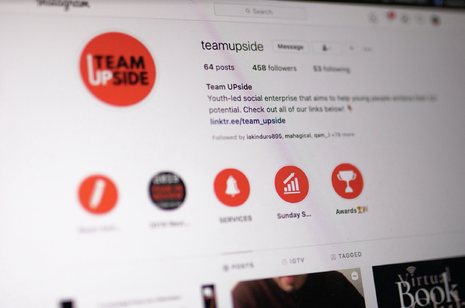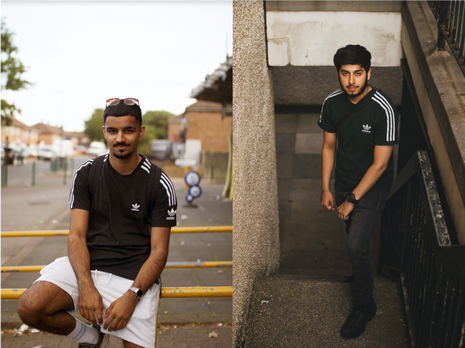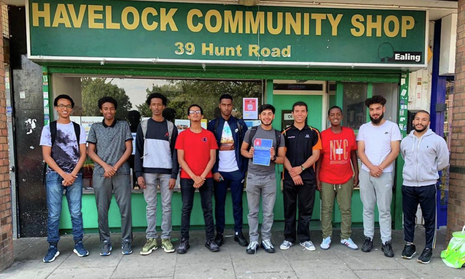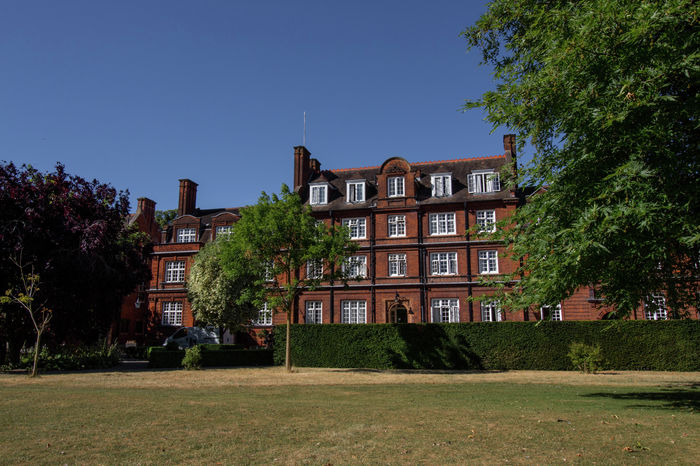Team UPside: the student-led initiative promoting access to higher education for all
Caterina Bragoli talks to students Sulaiman Iqbal and Hassan Raja about their decision to start Team UPside, the changes that need to be made in terms of access and making Oxbridge a possibility for students from disadvantaged backgrounds

It was recently confirmed that the University’s 2019-2020 admissions data for undergraduate students saw a record 68.7% of acceptances from state schools (comprehensive and grammar combined), an increase from 65.2% the previous year. While we can certainly celebrate this increased statistic, it’s equally fundamental to acknowledge that this percentage camouflages a wealth of regional and racial inequality. This discrepancy became a motivator for Cambridge students Sulaiman Iqbal and Hassan Raja to start Team UPside, an initiative that aids with access to higher education for students coming from disadvantaged backgrounds. In an effort to promote educational justice and help students realise their potential, Team UPside offers a great deal of resources, advice and motivation, designed to close the information gap and make Oxbridge a feasible opportunity for all.
The Cambridge application process is mystifying to many, to say the least. From the personal statement to the subject-specific examination, culminating in the final hurdle of the interview, it can often feel out of reach for students across the country. Yet, this is felt more acutely when there is a lack of information and resources to aid students that are brimming with potential, but come from non-traditional Oxbridge backgrounds, which certainly applies to both Hassan and Sulaiman. “When you come from a disadvantaged background where your school didn’t have the best resources, and you don’t have the same level of support that other people might have, luck becomes a massive factor in the process”, notes Hassan, who was one of only two people that received Cambridge offers from his school. His personal experience rings true with this sentiment, as he remembers “my school was alright, but when it came to applying to Oxbridge they had one teacher who essentially didn’t know what he was doing”. This is where the element of luck comes in for Hassan, as on a Queen Mary University of London open day he met someone “who used to lecture at Cambridge”, and so “asked him for interview help”. “If it weren’t for him, I don’t think I’d be here at Cambridge”, says Hassan, “because I had to go and seek out support that wasn’t readily available to me”.
“When you come from a disadvantaged background where your school didn’t have the best resources, and you don’t have the same level of support that other people might have, luck becomes a massive factor”
Sulaiman also spoke of his experience, and how it made him realise he “needed to do something” to address such profound socio-economic inequality. “I grew up in a council estate in West London, and in the area and the community which I grew up in there were quite a few social problems, with a lot of the young people who live on my estate getting involved with criminal activity and not finishing their exams”, he says, noting how he was also lucky to go to “a really good school outside my area where I had access to teaching that my peers didn’t have”. “When I left in 2018 to start Cambridge I felt a lot of responsibility and pressure - a lot of it was self-imposed - to come back and help”, says Sulaiman of his “subconscious responsibility”. Coming to Cambridge, he met “so many intelligent, bright young people”, and was able to “read a subject I was really passionate about”, which motivated him further to help relay this feeling onto those that might not even have considered it a possibility.
“I went to the local council in the London borough of Ealing, and I got them to give us a free space to rent out, and we would have a group of volunteers that would come every Sunday to give free tuition”, mentions Sulaiman as we begin to discuss the roots of Team UPside. Offering assistance, even in its earliest days, in a broad range of areas, including “GCSE tuition, A-Level tuition, writing CVs and personal statements”, Team UPside was born. Hence why the phrase “educational justice” lies at the heart of the enterprise: the knowledge received by Sulaiman, Hassan and their fellow volunteers became a valuable tool that they could redistribute to students from the same backgrounds and in the same position. Team UPside has experienced rapid development, as they currently offer a “weekly newsletter” and “an email help-desk service where students can email us their CVs and personal statements, and past papers, and we can give them feedback”.

This is currently paired with a wealth of online content, led by Hassan, due to the outbreak of coronavirus. “The pandemic and its impact on our everyday lives came as a shock to us all”, says Hassan, as “we had planned for our year to look a lot different, with a multitude of in-person events planned to build on the success of our inaugural Sunday sessions last Summer”. Yet, the new online content has proven to be extremely successful, as Team UPside have introduced concepts like the Virtual Book Club, ‘Inspiration From History’ documentaries (a series of one-minute documentaries “created to bring to light remarkable moments and people from history”), and Lockdown Learning (“a way of inspiring young people to learn new skills whilst being stuck indoors, ranging from fitness to writing and doing online courses”). While Hassan notes that “when you make anything online it’s easy to feel like no one is listening”, many of the team’s supporters have reached out. “It’s nice when people tell you that they are enjoying it and are benefitting from it”, says Hassan, and as a result “it’s been a really successful few months for us”.
However, this isn’t to detract from the most important form of interaction for Sulaiman and Hassan: despite being an evidently “flexible organisation”, Sulaiman comments that he truly values “interacting with young people face to face, going to their neighbourhoods or schools”. Going into schools, and the importance of interaction is, for Sulaiman, “the turning point” in allowing students from disadvantaged backgrounds to see Oxbridge as a feasible opportunity, despite what their perception of the application process is, or who they believe is the stereotypical Oxbridge student. Pre-GCSE access is crucial: “if you can get to them early and encourage them to take GCSEs seriously, [Oxbridge] will become more of a possibility”, notes Sulaiman. It’s “as soon as they underperform at GCSE [...], Oxbridge becomes unrealistic, so we need to get to them early”.
“People think Oxbridge is really unique and hard, but every degree is hard to some extent, and you are going to have stress and deadlines at any university”
Another way to make Oxbridge a workable and achievable option is “dispelling myths” surrounding workload, students and traditions, according to Hassan, as “it proves you don’t have to be a super genius to get in, especially having people that look like us and have the same backgrounds as us deliver these online resources, as it makes it easier for people to take on and relate to”. It provides “reassurance” when prospective students are feeling fearful, especially considering “people think Oxbridge is really unique and hard, but every degree is hard to some extent, and you are going to have stress and deadlines at any university”, hence why “getting rid of that mystical air is really important”, believes Hassan. Team UPside is also able to assist those that have already received Oxbridge offers, having provided a staggering 65 mock interviews, conducted by existing students, last year. “Many of the students we helped received offers and will be coming to Cambridge next year, studying subjects ranging from medicine to english to history”, reveals Sulaiman.

It can be challenging to promote the possibility of a Cambridge education when the University itself has historically “failed to offer opportunities equally across all sections of society”, says Sulaiman, further commenting “I do think the onus should be on Cambridge to address that issue because it’s such a rich institution and it has the resources, but it’s also in their interest as so many bright young people from disadvantaged backgrounds are missing out, and that’s the sad thing about it”. Both Hassan and Sulaiman emphasise that the University is certainly doing more in terms of outreach than ever before, with Hassan stating that “they are taking steps: they create campaigns and support student societies that are getting the message out saying “this is the place for you, you can make it”, but more of that needs to be done”. Hassan went on to suggest that “they could offer funding” to student-led enterprises such as Team UPside, and Sulaiman notes that “sometimes the best advice comes from people like us, because we’ve lived that experience, so if they funded [grassroot] groups like us then that would be a really great step”.
Sulaiman also mentions summer schools and opportunities, such as UNIQ and the Sutton Trust, that should receive more publicity: “The foundation programme that Lady Margaret Hall, Oxford offers - where students from less advantaged backgrounds can apply with slightly lower grades - gets them a step through the door. Cambridge should do something to match that as well”. Whilst Cambridge does take part in the Sutton Trust summer school scheme, there is room for more. Another suggestion from Sulaiman is that “the University could offer mock interviews to students from disadvantaged schools before they have their real interviews”, as that’s an outreach step “they could tangibly take” (they currently offer video depictions of interviews on University/department Youtube channels). Ultimately, there is a problem at Cambridge, not just proven by the introductory statistic, but by shocking facts like “when more kids from Westminster come to Cambridge than Black students”, says Sulaiman. “There’s a clear problem that certain groups just don’t have the same resources and it’s unfair”, he concludes, despite “certain colleges like Fitzwilliam leading the front”.
Despite this, Hassan believes that: you have to get spurred on by little bits of progress, as it’s knowing that change happened before you were here, and it’s happening now, and it will keep happening when you leave”. And we at Cambridge can assist Team UPside in contributing to this climate of change: “directly, students can help volunteer with us as soon as we have real-life events, and they can also take part in the mock interview day that we can hopefully carry out again in November”, says Sulaiman. Also, “they can encourage their friends and schools to get in touch with us so that we can expand our reach”, he adds. We need to adopt a “broader perspective as Cambridge students”, says Hassan: “acknowledge that you’re in a place where all of a sudden you have massive privilege and access to these big networks, so it’s just giving back”. “For me personally, I know I overcame all of these obstacles to get here, and whatever I can do to plug that gap, I will”.
Team UPside is undeniably bringing about a vital change, and a change that, in our current climate, is more needed than ever before. “Seeing individual cases” is what fills Hassan with the most pride, as “knowing that they faced the same barriers as me and we were able to step in is amazing”. “It’s the ripple effect” that inspires Sulaiman the most, “as [past participators] feel indebted to the organisation and they want to go and help as well, as they feel they have a responsibility to help the next person”. Hassan and Sulaiman, along with the other committee members of Team UPside, have certainly created a legacy for themselves: a legacy of social justice, narrowing the information gap and making Cambridge a dream and a reality for those that never even considered it as a possibility in the first place.
Team UPside have created an email template for students to use if they’ve missed out on their Oxbridge offers due to the unjust grading system, which over 1,372 students have accessed. It can be found here.
Varsity has contacted the University for a response regarding their approach to access.
 News / Right-wing billionaire Peter Thiel gives ‘antichrist’ lecture in Cambridge6 February 2026
News / Right-wing billionaire Peter Thiel gives ‘antichrist’ lecture in Cambridge6 February 2026 News / Cambridge students uncover possible execution pit9 February 2026
News / Cambridge students uncover possible execution pit9 February 2026 News / Epstein contacted Cambridge academics about research funding6 February 2026
News / Epstein contacted Cambridge academics about research funding6 February 2026 News / Man pleads guility to arson at Catz8 February 2026
News / Man pleads guility to arson at Catz8 February 2026 News / John’s duped into £10m overspend6 February 2026
News / John’s duped into £10m overspend6 February 2026










